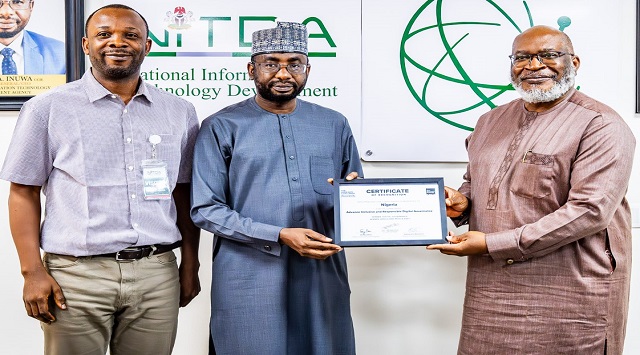News
Public-Sector Digitization Posses Trillion-Dollar Challenge- McKinsey

The full benefits of digitization could be huge, but to realize them, McKinsey Insights show that governments need to tackle the factors that make many e-government efforts fall short of their promise.
In the report, Cem Dilmegani, consultant in McKinsey’s Istanbul office, where Bengi Korkmaz is a principal and Martin Lundqvist, principal in the Stockholm office, wrote that, citizens and businesses now expect government information to be readily available online, easy to find and understand, and at low or no cost.
McKinsey is a global firm, comprising more than 9,000 consultants and nearly 2,000 research and information professionals. It has office more than 60 countries, including Nigeria.
According to McKinsey, governments have many reasons to meet these expectations by investing in a comprehensive public-sector digital transformation.
The analysis suggests that capturing the full potential of government digitization could free up to $1 trillion annually in economic value worldwide, through improved cost and operational performance.
Shared services, greater collaboration and integration, improved fraud management, and productivity enhancements enable system-wide efficiencies. At a time of increasing budgetary pressures, governments at national, regional, and local levels cannot afford to miss out on those savings.
Dilmegani, Korkmaz and Lundqvist, wrote, “Indeed, governments around the world are doing their best to meet citizen demand and capture benefits. More than 130 countries have online services. For example, Estonia’s 1.3 million residents can use electronic identification cards to vote, pay taxes, and access more than 160 services online, from unemployment benefits to property registration. Turkey’s Social Aid Information System has consolidated multiple government data sources into one system to provide citizens with better access and faster decisions on its various aid programs. The United Kingdom’s gov.uk site serves as a one-stop information hub for all government departments.
“Such online services also provide greater access for rural populations, improve quality of life for those with physical infirmities, and offer options for those whose work and lifestyle demands don’t conform to typical daytime office hours”.
The trio, however, asserted that, despite all the progress made, most governments are far from capturing the full benefits of digitization.
“To do so, they need to take their digital transformations deeper, beyond the provision of online services through e-government portals, into the broader business of government itself. That means looking for opportunities to improve productivity, collaboration, scale, process efficiency, and innovation,” the report showed.
The public-sector challenge, they listed include that digital transformations require changes, to both processes and IT systems, that are more challenging to implement in the public sector than in the private sector.
Also, joint study by McKinsey and Oxford University found that “public-sector IT projects requiring business change were six times more likely to experience cost overruns and 20 percent more likely to run over schedule than such projects in the private sector”.
The public sector must cope with additional management issues, including multiple agencies, a range of organizational mandates and constituencies, longer appropriations timelines, and the challenge of maintaining strategic continuity even as political administrations change.
“Therefore, it is important that private-sector companies supporting public IT transformations understand that the public sector operates in a different context. For example, it can be challenging to set a specific target, build consensus, align on a leadership structure, secure funding, and meet implementation timelines.
“Similarly, when systems and data are owned by different departments and functions, on a range of platforms and with differing taxonomies and access requirements, it can be difficult to invest at scale and generate sufficient economies. Silos, fragmentation, and the absence of a central owner for nationwide IT infrastructure and common components can make it hard to connect the internal “plumbing” to create a seamless experience for the end user, be it a government worker, a business user, an average citizen, or another intergovernmental office. It doesn’t make the task easier when the complexity of large-scale digital projects requires specialized skills and expertise that come at a high price and are often in short supply. In consequence, many e-government efforts fall short of their promise”.
Achieving comprehensive public digitization, McKinsey believes that while digital transformation in the public sector is particularly challenging, a number of successful government initiatives show that by translating private-sector best practices into the public context it is possible to achieve broader and deeper public-sector digitization.
News
NITDA Partners OGP to Drive Presidential Digital Goals

The Director General of the National Information Technology Development Agency (NITDA), Kashifu Inuwa, CCIE, has reaffirmed Nigeria’s commitment to open governance, transparency and inclusive digital development as the Open Government Partnership (OGP) team formally presented the award and certificate received at the OGP Global Summit Spain 2025 to the Agency’s leadership.

Nigeria emerged as the overall global winner in the Digital Governance category in recognition of the country’s excellence in deploying digital tools and policies to strengthen government transparency, accountability, and citizen engagement. In addition, Nigeria received the Regional Award for advancing Open Digital Governance across Africa and the Middle East, reaffirming its leadership role in promoting open government principles and driving digital transformation across the region.
These recognitions were largely attributed to initiatives led by NITDA in collaboration with civil society partners, such as Dataphyte, which showcased innovative and inclusive approaches to digital governance at the summit.
The summit, which was organised in Vitoria-Gasteiz, Spain, brought together more than 1,500 high-level representatives of governments, civil society leaders, and policymakers from around the world to exchange experiences, best practices, and progress on open government initiatives and implementation on key issues.
Receiving the OGP delegation at NITDA, Inuwa described the recognition as a national honour rather than an institutional one, stressing that the award reflects Nigeria’s collective efforts across government, civil society and the private sector in advancing open governance principles through the digital space.
According to him, such global recognition comes with heightened responsibility to deliver on commitments made under the OGP framework.
“This is not just about NITDA. It is a national recognition, and every recognition comes with responsibility,” the DG said.
“If we fail to execute the commitments we have made, it will not only affect our image locally but also at the international stage. This is also not something NITDA can do in isolation,” he added.
Inuwa linked the achievement directly to the Renewed Hope Agenda of President Bola Ahmed Tinubu, noting that digital transformation, transparency, economic diversification, job creation and efficient public service delivery remain central presidential priority areas.
He emphasised that leveraging digital technologies to deepen openness and accountability aligns with national objectives of strengthening institutions, improving governance outcomes and building trust between government and citizens.
Highlighting the importance of collaboration, the NITDA boss underscored the role of the OGP platform as a catalyst for a strong multi-stakeholder approach in Nigeria’s digital ecosystem.
He called on civil society organisations, development partners, the private sector and other government institutions to provide technical expertise, guidance and sustained engagement to ensure effective implementation of agreed commitments.
“We need to leverage the OGP platform. We need your expertise, your guidance, your support and your commitment to hand-hold us in delivering on these commitments,” he said.
He further noted that “a multi-stakeholder approach in the digital space is critical to fostering a resilient ecosystem that delivers real value to citizens.”
Inuwa disclosed that NITDA has already begun internal reviews of its OGP commitments and has tasked its representatives, including Dr Rousseau, to work with colleagues to develop a clear execution strategy.
He proposed the creation of joint work streams with OGP stakeholders to support implementation, ensure accountability and keep all parties on track.
“We are humans. Oversight and collaboration help us stay focused. With commitment, nothing is impossible, and I believe these goals are achievable,” he added, assuring the delegation of NITDA’s readiness and political will to deliver on all agreed commitments.
Inuwa also welcomed the idea of engaging the political leadership of OGP, including the Honourable Minister of Budget and Economic Planning, with a view to briefing President Tinubu on the achievement. He noted that celebrating milestones is important, as it reinforces morale and demonstrates that Nigeria’s efforts in digital governance are gaining global recognition.
“It’s also good when there are wins, we should celebrate, because we too never knew that the little things we are doing are noticed not just within Nigeria, but globally, to the extent of earning us this award,” he asserted.
He concluded by expressing gratitude to the Nigerian National OGP Secretariat and the global OGP leadership, reaffirming NITDA’s commitment to strengthening collaboration and building a more productive working relationship that will translate open governance principles into measurable national impact.
Earlier in his remark, Mr Olusoji Apampa, who led the OGP deelegation, said the honours were earned through a strong partnership between government and civil society, with NITDA playing a critical role, particularly in commitments focused on improving digital governance in Nigeria.
Apampa expressed hope that the awards would serve as added momentum to deepen ongoing commitments under NITDA’s leadership and accelerate the practical implementation of reforms aimed at strengthening digital governance across the country.
News
PalmPay Launches N400 Million World Travel Carnival, Rewarding Users with Free Global Trips

PalmPay, Nigeria’s leading digital banking platform, has announced the launch of its ₦400 million festive rewards campaign, designed to reward users with cash prizes and fully sponsored international travel experiences for everyday transactions on the PalmPay app.

The campaign will run from December 17, 2025, to January 8, 2026. The campaign is designed to reward everyday transactions with extraordinary experiences. It runs alongside PalmPay’s Purple December brand campaign, which focuses on wrapping up the company’s key brand and community initiatives for the year.
At the centre of the rewards campaign is the PalmPay World Travel Carnival, an interactive card collection experience that allows users to earn city cards by completing transactions on the app. Users are required to collect five city cards – London, New York, Dubai, Sydney, and Cape Town and combine them into a World Card, which unlocks a share of the prize pool.
The more World Cards a user creates, the larger their share of the cash rewards. Any extra uncombined cards can be swapped with friends and other PalmPay users to help complete additional World Cards.
Beyond cash rewards, the Carnival also offers Free Global Trips. In each round, the top two users with the highest number of eligible transactions (₦100 and above) and at least one World Card will win an all-expense-paid international trip.
The travel grand prize covers:
- Visa fees
- Round-trip international airfare
- 5-day, 4-night hotel accommodation
- Side attraction
- Meal expenses
- Airport pick-up and drop-off
- All transportation for scheduled tour activities during the trip
Winners will be determined through a transparent leaderboard system, with prizes credited automatically at the end of each round on December 25, December 31, and January 8.
Participation is simple:
- Complete tasks on the PalmPay app, such as Airtime, Data, Transfers, and other specific transactions listed in the app, to earn cards.
- Collect all five city cards.
- Swap cards with friends to complete your collection.
- Combine cards to form a World Card and earn cash rewards.
- Perform more transactions to climb the leaderboard for a chance at the global trip prize.
To ensure fairness, PalmPay has instituted strict rules: no cheating, bots, fake accounts, or manipulation. Any violations may lead to disqualification or account bans. Additionally, the Free Travel Prize is limited to one per user throughout the campaign.
Speaking on the launch, Femi Hanson, Head of Marketing & Communication, “This festive rewards campaign is about turning everyday banking into meaningful value for our users. With the World Travel Carnival as the headline activation, we are reinforcing PalmPay’s promise of being the smarter way to bank—where smart financial decisions unlock bigger opportunities.”
News
REA, NBS Partner to Deliver Comprehensive Energy Data for Nigeria

The Rural Electrification Agency (REA) and the National Bureau of Statistics (NBS) have signed a Memorandum of Understanding (MoU) to conduct a nationwide energy survey aimed at closing long-standing data gaps in Nigeria’s power sector. The initiative is expected to guide policy, attract investment, and accelerate universal electricity access.

Signed in Abuja, the agreement establishes a National Energy Survey based on the Multi-Tier Tracking Framework (MTF), a globally recognized methodology that measures electricity access not only by grid connection but also by quality, affordability, reliability, and usage of electricity and clean cooking solutions.
The survey will be implemented under the Energy Sector Management Assistance Program (ESMAP) of the World Bank. Dr. Abba Aliyu, REA Managing Director/CEO, said the partnership underscores REA’s commitment to evidence-based rural electrification planning and will generate detailed insights on electricity access and off-grid solutions nationwide.
Prince Adeyemi Adeniran, Statistician-General of the Federation/CEO of NBS, emphasized that reliable statistics are essential for effective policymaking, assuring that NBS will provide technical oversight, sampling expertise, and quality assurance to meet global standards.
The survey will assess energy access, household affordability, expenditure patterns, and the adoption of off-grid technologies such as solar home systems, mini-grids, and clean cooking solutions. REA will provide sector expertise and policy alignment, while NBS manages regulatory approvals, methodology, and technical supervision.
Funded and technically overseen by the World Bank, the exercise will run for 18 months, with the resulting data expected to improve national energy planning, programme targeting, and private sector investment, particularly in underserved and rural communities.
Officials said the collaboration reflects the Federal Government’s commitment to strengthening inter-agency coordination, enhancing energy data availability, and advancing Nigeria’s goal of universal electricity and clean cooking access.

 E-Business2 days ago
E-Business2 days agoCheck Point Reveals Nigeria as Second Most Targeted African Country for Cyberattacks in November

 Telecom2 days ago
Telecom2 days agoAirtel Africa Partners Starlink to Launch Direct-to-cell Service in 14 Markets

 News2 days ago
News2 days agoREA, NBS Partner to Deliver Comprehensive Energy Data for Nigeria

 E-Financial2 days ago
E-Financial2 days agoCBN Revokes Licenses of Two Mortgage Banks, NDIC Begins Liquidation

 E-Financial2 days ago
E-Financial2 days agoCBN Revokes Licences of Aso, Union Homes Mortgage Banks Over Regulatory Breaches

 E-Business2 days ago
E-Business2 days agoMicrosoft Empowers 350,000 more Nigerians with AI Skills

 Broadcasting2 days ago
Broadcasting2 days agoMultiChoice Talent Factory Calls for Entries Into Fully Funded Film Training Programme

 General News1 day ago
General News1 day agoFirstCap Acts as Joint Issuing House on Veritasi Homes & Properties Plc’s ₦30 Billion Bond Programme















